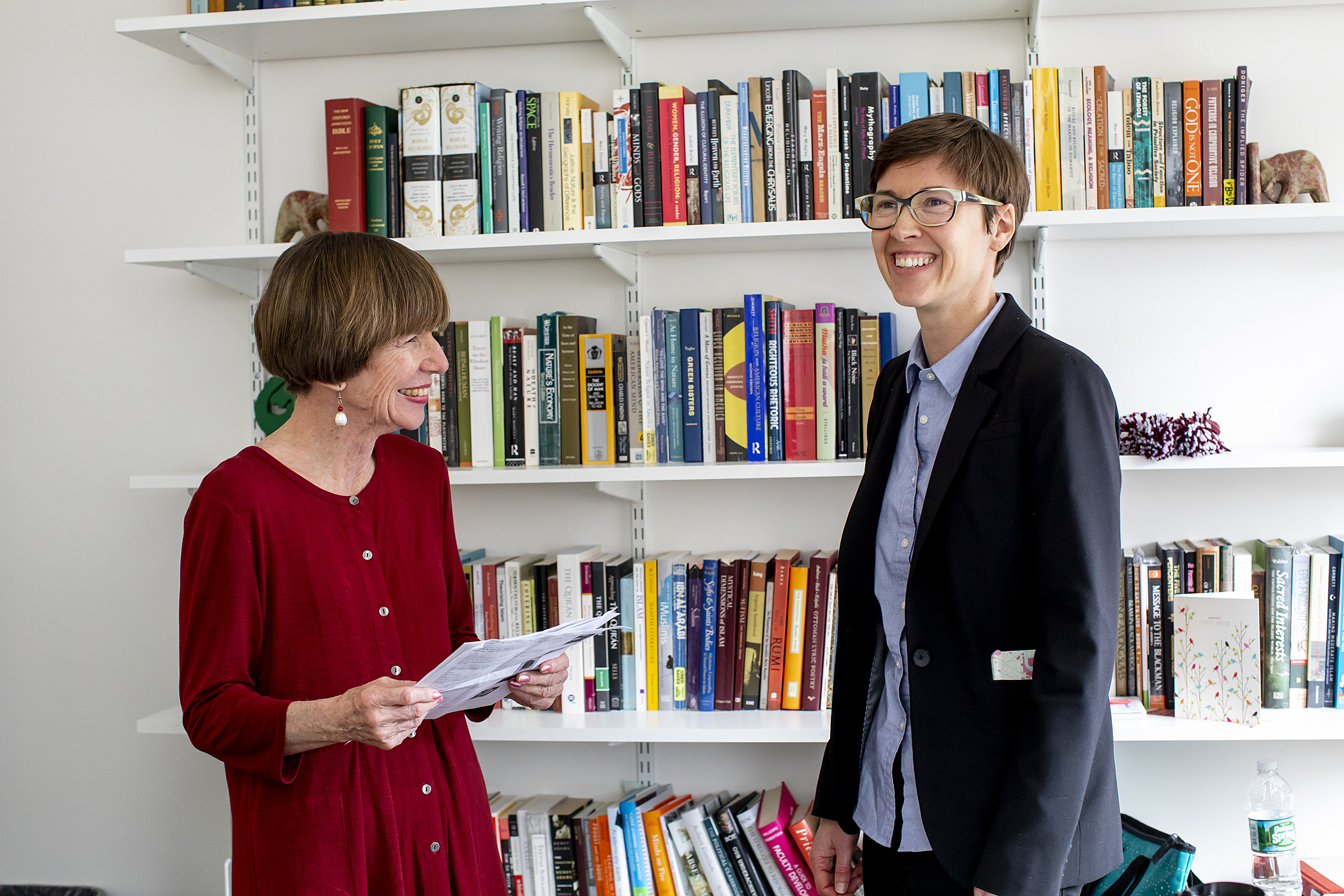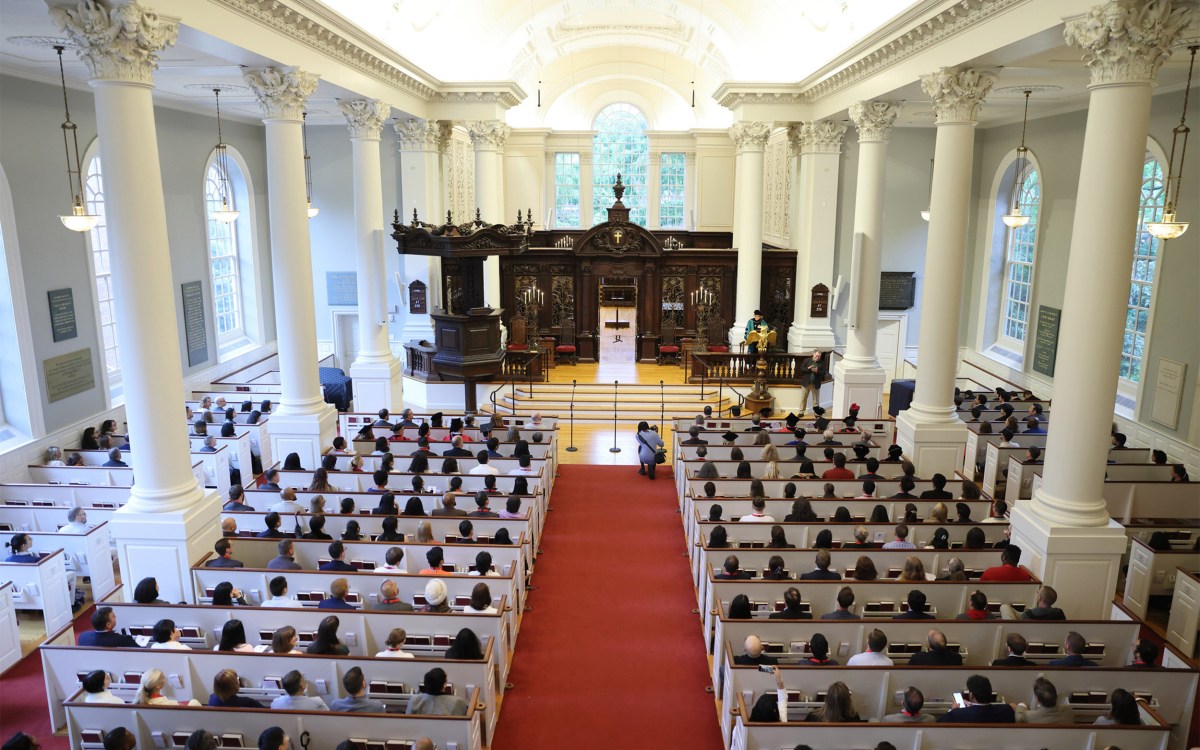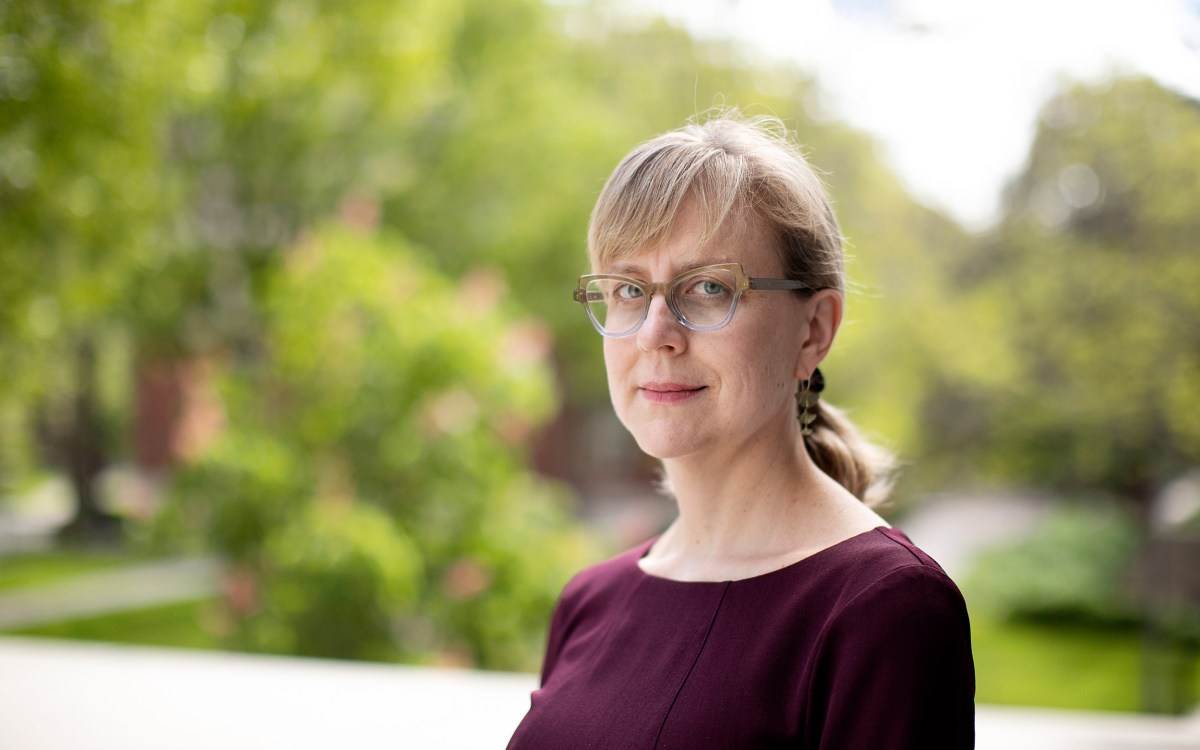
Kathleen Coleman (left) and Eleanor Finnegan discuss the new General Education course on the experience of loss.
Rose Lincoln/Harvard Staff Photographer
Intensely personal, yet universal
Harvard’s Gen Ed curriculum encourages broad and deep examinations of Big Questions
When Kathleen Coleman decided to create a new General Education course, she homed in on something universal: the inevitability of loss.
“A couple of years ago, faculty were asked to think of courses that would help to prepare students for problems they were facing in their lives on a global scale, like climate change or terrorism,” the James Loeb Professor of the Classics said. “I immediately thought of something that everybody will have to face: personal loss.”
As one of 160 classes comprising the College’s new program in General Education, which launches this fall, Coleman’s course examines reactions to death, amputation, exile, homelessness, and other crises. This comprehensive, cross-disciplinary approach illustrates the larger goals of the Gen Ed Program, which focuses on urgent problems and enduring questions that connect educational studies to the world outside the classroom. The program comprises four areas: Aesthetics & Culture, Ethics & Civics, Histories, Societies, Individuals, and Science & Technology in Society.
“We want Gen Ed courses to be distinctive, not only in the kinds of questions they pose and the kinds of approaches they take, but also in the way they’re taught,” said Dean of Undergraduate Education Amanda Claybaugh.
Coleman has three goals for her class, which is part of Aesthetics & Culture: to help students prepare to face major setbacks in their lives, to teach them how to develop empathy toward others who have suffered a loss, and to show them that the arts can provide comfort.
“I want them to know that people long ago and far away have felt the same things they may be feeling, and that we can reach out across the millennia and hold the hand of someone who has been there before us,” she said, citing requiem masses; Joan Didion’s memoir about the death of her husband, “The Year of Magical Thinking”; and Houston’s Rothko Chapel, an art-filled interfaith sanctuary, as examples on the syllabus.
Other offerings include classes on the end of the world, sleep, and the morality of money. Sociology lecturer Manja Klemenčič was encouraged to create her new Gen Ed course, “Higher Education: Students, Institutions, and Controversies” (Histories, Societies, Individuals), by undergraduate students who took her seminar, which explores similar themes.
“The topic of higher education lends itself to students’ lives now and in the future, and it is important to understand as a social phenomenon,” she said. “I wanted to teach this on a larger scale [through Gen Ed] to allow for multidisciplinary perspectives, which make for wonderful, engaging conversations and peer-to-peer learning.”
“I want [students] to know that people long ago and far away have felt the same things they may be feeling, and that we can reach out across the millennia and hold the hand of someone who has been there before us.”
Kathleen Coleman, James Loeb Professor of the Classics
For the Gen Ed class, Klemenčič changed the seminar’s individual research project requirement to a group assignment to give students the chance to do rigorous research with peer support.
“This approach is more difficult,” she said. “But I’m ambitious about trying to manage the groups and do the logistics to support the groups if they have problems and getting them comfortable with each other.”
As part of their course development process, Coleman and Klemenčič worked with the Derek Bok Center for Teaching and Learning on syllabi and course components such as field trips and interactive activities. Both participated in a pilot Course Design Institute (CDI) this spring funded by a grant from the Davis Educational Foundation, in which the Bok Center brought together Gen Ed faculty and colleagues from campus libraries, museums, academic technology, and the Harvard College Writing Program.
Over the CDI’s five sessions, faculty worked with peers and in one-on-one consultations with Bok Center staff to design learning goals, capstone projects, and well-aligned modules for their courses. The program was conducted by Eleanor Finnegan, assistant director of faculty programming; Adam Beaver, director of pedagogy and practice; and Jonah Johnson, assistant director for writing pedagogy and a head preceptor in the Harvard College Writing Program.
“Courses are living organisms, and a syllabus can and should evolve,” said Beaver. “By encouraging faculty to talk with each other early and often about their teaching, we hope to lower the barriers to collaboration and innovation throughout the curriculum.”
“The people in the Bok Center are very encouraging and practical,” said Coleman, whose plans for her course include field trips to Mt. Auburn Cemetery and the Harry Widener Memorial Room, among other locations. “They showed genuine interest in the different courses, and they helped me think outside the box about how I could develop the arc of mine.”
“Getting all the students in a course to the same place in a 13-week arc is a challenge for faculty that requires self-transparency and outward transparency,” said Johnson. “Given the aims of the Gen Ed program, we’re trying to create a context where the unspoken logic behind course design is as explicit as possible for faculty and students.”
Klemenčič said the CDI allowed her to think bigger about how to engage students with theory and research methods they may not have encountered before. “This support allowed me to be more ambitious and to do the things I always wished to do but haven’t had the chance to pursue,” she said.






